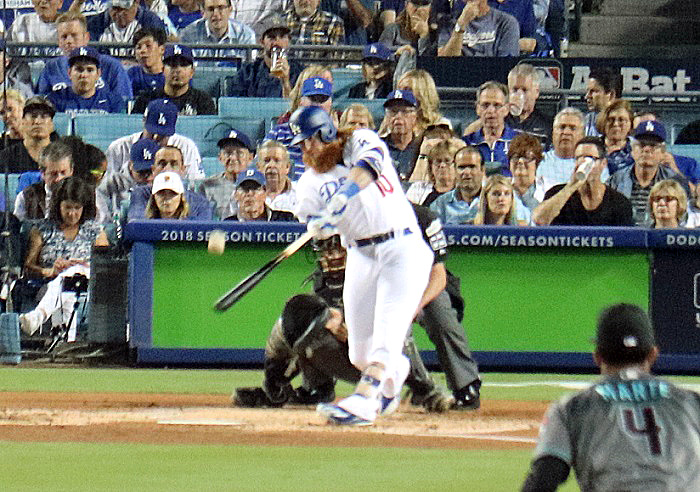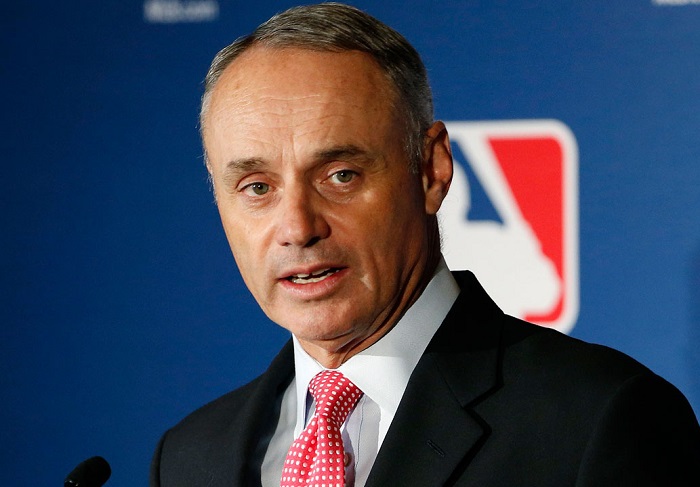There are some – many, in fact – who are hoping that Dodgers President of Baseball Operations Andrew Friedman will soften his stance on re-signing extremely popular (now) free-agent third baseman Justin Turner; if for no other reason than to have him become the team’s designated hitter if/when that eventually happens in the National League. The hang-up, of course, is that Turner (through his agent Greg Genske of VaynerBaseball Agency) is seeking a four-year deal, whereas Friedman is reluctant to offer the heavily-bearded 36-year-old Long Beach, CA native anything beyond two years.
The hopes of the many wanting to see Turner as their team’s DH took a huge step backward on Monday when The Athletic‘s Ken Rosenthal reported that the MLB Players Association rejected Major League Baseball’s most recent proposal to implement a universal designated hitter
According to Rosenthal’s article (subscription required), MLB “…offered up a universal DH and a willingness to rule in favor of two players on a pair of service time grievances, but in exchange, they sought an agreement on expanded playoffs, the implementation of a pitch clock and a Spring Training trial run with electronic strike zones, among other elements.”
Per the Rosenthal piece, “…the lack of clarity on whether there will be a DH in the National League next season continues to serve as a major impediment for teams and for some free agents alike. Nelson Cruz and Marcell Ozuna, in particular, can’t fully get a grasp on their markets until they know whether the NL will carry a DH. Meanwhile, NL teams are left to build a lineup and a roster without knowing whether they’ll have a spot for an extra hitter.”
You can now add Turner’s name to this list.

Surprisingly, the MLBPA does not view the addition of a designated hitter in the National League to be as advantageous to its side as MLB does. The reason for this is because most AL teams no longer employ expensive players solely to be their designated hitters, instead opting to spread that assignment around based on pitching match-ups. The union also believes that expanding the number of playoff teams would generate far more revenue for the league than its members.

Rosenthal notes that MLB’s latest offer included an extra $30 million or so to be divided up among players, but team revenues would be much greater (he estimates $50 million). Under the traditional (pre-2020) structure, players’ postseason shares were tied to gate revenue, while teams collect 100 percent of television revenues. Knowing that there would be no fans in 2020, the players agreed to an expanded 16-team playoff field that saw $50 million in television revenue divided amongst players.
Rosenthal added that from the players’ vantage point, postseason expansion is a double-edged sword. A greater chance to play in October could very well be appealing, but there are likely some who, like many fans, worry about “watering down” the field. Of greater concern is how postseason expansion could also impact free agency. The league would surely argue that increasing the field will motivate borderline clubs to spend more on the open market, thus making it a win for the players.
However, the opposite effect could also play out as well. If the bar to reach the postseason is lowered, some clubs won’t feel compelled to spend for an extra couple of wins to push themselves over the top. The margin for error is much greater when nearly half (or more) of the teams in the game qualify for postseason play than it is when only a third of clubs do. This is especially true when, at any given point, there are a handful of teams tanking and actively doing everything they can to not win games to improve their future drafting positions.
Rosenthal added that there is a substantial disconnect between the extent to which the MLB and the MLBPA feel that a universal DH will benefit players. The MLBPA knows that playoff expansion (and the associated increased revenue) is a huge bargaining chip to leverage in upcoming talks towards a new Collective Bargaining Agreement, which will occur following the 2021 season. Rosenthal sees this as too large of a concession for the MLBPA to make in exchange for the universal DH.
Manfred has continually sought to increase in-game action, and considering that pitchers posted a combined .128/.160/.162 batting line with a 44 percent strikeout rate in 2019, swapping them out for a competent hitter would help with that goal. That being said, National League baseball traditionalists abhor the mere thought of a DH in their beloved league and are overwhelmingly against its implementation – period. But at this point, it seems inevitable, whether in 2021 or 2022.
As labor lawyer Eugene Freedman recently posted on Twitter, this scenario’s framing as a negotiation is somewhat misleading. The two sides already have an agreement in place under the current (2016-2021) CBA. The union is under no obligation to renegotiate that agreement simply because Manfred is now making a push for an expanded postseason format.
All of this said, the MLBPA’s latest rejection to the DH in the NL does not mean that the two sides won’t eventually agree to work something out. The league is obviously very motivated to expand the upcoming postseason field and grow its postseason revenues. Perhaps they will put together a more enticing offer to the Players Association. We saw the two sides’ willingness to work together for the COVID-19-shortened 2020 season at the last minute. In fact, the 2020 expanded postseason format was agreed upon a mere three hours before the first pitch of the 2020 season on Opening Day.
Stay tuned…
* * * * * *




 January 26th, 2021 at 9:00 am
January 26th, 2021 at 9:00 am  by Ron Cervenka
by Ron Cervenka  Posted in
Posted in 

Great info! The union doesn’t view the universal DH as a big trade chip to acquire, knowing that the NL is almost forced to agree to that position in the next contract in Dec. 2021. Like every union, the Players Association wants more money for the players and less work. It is always about the money, the other stuff is just misdirection — as Rod Tidwell yelled in the movie “Jerry Maguire” — SHOW ME THE MONEY!